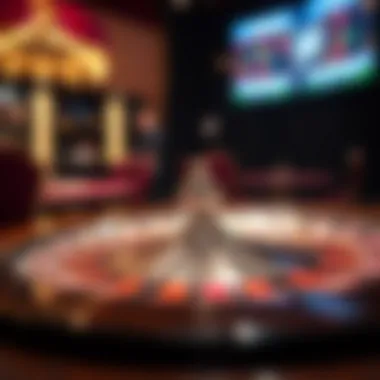Mastering the Seven Bet Roulette System for Success


Intro
The world of roulette often feels like a whirlpool of chance and strategy. While the spinning wheel and bouncing ball may resemble a simple game of luck, there’s an intricacy behind it that seasoned gamblers appreciate. The Seven Bet Roulette System is one such approach that seeks to navigate this complexity. It’s not just about placing bets at random and hoping for the best; it’s a calculated methodology designed to optimize one’s playing experience. This system involves not just understanding the game mechanics but also delving into the psychological landscape of betting.
As we embark on this exploration, we will dissect how this system may enhance your gaming experience, dissect its components, and the strategies that can give you an edge. Gaining insight into effective bankroll management and risk assessment will be crucial here. This is about making informed choices rather than throwing money into the void and hoping luck shines favorably.
Sterling in its design, the system embodies both theory and practical applications—each intertwining with the next. Your familiarity with the game, alongside detailed strategies, will prepare you to engage not just with the spins but also with the tactical mindset that roulette demands. If roulette were a canvas, the Seven Bet Roulette System could be considered a finely crafted brushstroke, aiming to create a masterpiece in every spin.
Prelims to the Seven Bet Roulette System
In the dynamic world of casino games, roulette stands as a tantalizing blend of chance, strategy, and excitement. The Seven Bet Roulette System emerges as a noteworthy approach for players looking to enhance their betting technique while engaging with the roulette wheel. Understanding this system is crucial, as it promises not just an enriched gaming experience but an insight into the broader mechanics at play in casinos. This guide seeks to illuminate the Seven Bet System, delving into how one can utilize it effectively and what one should consider before diving into betting sessions.
The importance of this topic lies in its capacity to empower players. Anyone stepping into a casino often carries a sense of anticipation, mingled with trepidation. The Seven Bet System aims to provide more than just luck; it offers a road map, a structured approach that can demystify some aspects of roulette. The essence of this system revolves around strategically placing bets in a sequence that can potentially amplify wins while minimizing losses.
Before embarking on this journey, players ought to grasp the fundamentals of roulette itself, as well as the different betting frameworks that have evolved over time.
By the end of this guide, readers will not only become familiar with how to apply the Seven Bet System but will also understand essential considerations, such as bankroll management and the psychological factors influencing betting decisions.
"The key to mastering roulette lies not in blind luck, but in informed choices and a disciplined approach."
As we explore the intricacies of this betting system, we'll unravel the layers of strategy and reflection that go beyond simple chance.
Understanding Roulette Basics
Before diving into the Seven Bet System, players must have a firm grasp of roulette’s operating principles. The game is essentially about predicting where a small ball will land on a spinning wheel divided into numbered pockets. A mix of red and black pockets, along with a green zero (or double zero) for American roulette, creates both excitement and opportunity.
Each spin is an independent event, influenced by factors of probability but ultimately driven by chance. Players can place a variety of bets—on individual numbers, combinations of numbers, or broader categories like red/black or even/odd. With each bet, there lies the potential for different returns, making it vital for bettors to understand the odds and payouts associated with each option.
Here are some key fundamentals for every roulette player:
- Types of Bets: Inside bets (higher payouts) versus outside bets (safer options).
- House Edge: Understanding how the casino maintains an advantage, especially when looking at European vs. American wheels.
- Payout Ratios: Familiarity with common payoffs helps frame expectations during gameplay.
This foundational knowledge sets the stage for exploring the complexities of the Seven Bet System, allowing players to appreciate its strategic underpinnings.
Overview of Betting Systems
Roulette has seen countless betting systems proposed throughout the ages, each claiming to provide the proverbial ticket to success. Betting systems are structured methodologies that players can use to determine their stake sizes and betting patterns based on previous outcomes. While no method can guarantee victories—because each spin is independent—the strategic frameworks can help shape player decisions as they navigate their sessions.
The Seven Bet System itself is part of a larger index of betting methodologies, often compared to others, including the Martingale, Fibonacci, and Labouchere systems. What makes the Seven Bet System distinctive is its sequence and structure, providing a roadmap rather than a purely reactive strategy. This systematic approach allows bettors to plan their actions over seven distinct bets, adjusting as necessary depending on wins or losses.
Consider the following when thinking about different betting systems:
- Risk Management: Each system comes with its unique risk profile, with some focusing on aggressive play and others on conservation.
- Flexibility: Players need to assess their adaptability to changing scenarios—some systems may work best under specific conditions.
- Personal Comfort: What feels right to one player may spark anxiety in another; familiarize yourself with different approaches to find your fit.
By building a solid understanding of how betting systems work, players can better grasp the significance of the Seven Bet Roulette System and make informed decisions within their gaming strategy.
Core Principles of the Seven Bet System
The Seven Bet Roulette System hinges on structured betting that offers players a systematic approach to the game. By adhering to certain core principles, bettors can harness a more organized method of play, which can lead to strategic advantages in the chaotic world of roulette. It’s not just about luck but understanding how various elements interplay during the game.
Betting Structure Defined


The crux of the Seven Bet System lies in its betting structure. A player doesn’t just throw chips on the table with wild abandon; there’s a definite scheme involved. Each of the seven bets is carefully planned to mitigate risk while maximizing potential payout. The typical structure uses a combination of outside bets, such as red or black and even or odd, paired with inside bets, focusing on specific numbers.
What makes this structure powerful is its ability to adapt. Players can adjust their bet amounts based on winning or losing streaks, providing a flexible safety net. This systematic approach allows for more informed decisions throughout gameplay. In essence, you feel like you’re steering the ship, rather than merely bouncing around on waves of chance.
"A well-defined betting structure doesn’t just guide your gameplay; it becomes a lifeline in the unpredictable sea of roulette."
Sequential Bet Patterns
Moving onto sequential bet patterns, this principle emphasizes the importance of observing the outcomes before placing future bets. The essence here is to analyze trends—looking for blocks of numbers or colors that appear during your session. While it's a familiar saying that history doesn't repeat itself, patterns can emerge that suggest certain numbers may be “due.”
Players might utilize a prior results tracking system to spot favorable patterns. For example, if red shows up six times in a row, a player might increase their bet on red, buying into the notion that it's likely to continue. However, it’s paramount to balance such instincts with rationality. Over-reliance on trends can lead to rash decisions, translating into unnecessary losses.
Probability and Expectation
Finally, let's consider the ideas of probability and expectation. Understanding that every bet carries its own likelihood of winning, the Seven Bet System aims to maximize expected value across multiple bets. A crucial aspect of this principle is distinguishing between short-term outcomes and the long game.
By embracing a mindset rooted in probability, players can anticipate the risks involved. For instance, betting on a single number presents a much lower probability than betting on red or black. However, the higher risk also comes with a juicier payout. Evaluating these factors is essential for making informed betting decisions.
In summary, the core principles teach us that roulette isn’t just about guessing but rather understanding and managing risks strategically. Recognizing how betting structures, patterns, and probabilities contribute to a player’s overall strategy can elevate their gameplay, promoting not only a more analytical approach but ultimately enhancing the gaming experience.
Practical Application of the Seven Bet System
The practical application of the Seven Bet Roulette System is where theory meets the spinning wheel. Knowing the core mechanics of this betting strategy is essential, as it provides players a framework to enhance their gaming experience and manage their finances more adeptly. By understanding how to implement the system effectively, gamblers can find both enjoyment and structure in their sessions, ultimately aiming for a more consistent approach rather than leaving outcomes to chance.
Setting Up a Session
Setting up a session using the Seven Bet System requires a balance of strategy and mental preparedness. To get started, players first need to establish a comfortable setting where they can focus. Here’s a checklist of steps to consider:
- Choose the Right Environment: Pick a casino or an online platform that feels welcoming and has a positive atmosphere. Avoid places that feel rushed or chaotic.
- Know Your Limits: Before diving in, determine your betting limits. Having a budget helps to maintain control over your spending and adds to a more enjoyable experience.
- Select a Table: It's advisable to select a roulette table that offers the right type of game, such as American or European roulette. Each has distinct odds that may affect your outcomes.
- Prepare Mentally: Being mentally ready is crucial. Take a moment to clear your mind, whether that means engaging in deep breathing, recalling past strategies, or even reviewing betting patterns that have been effective for you.
By establishing these elements beforehand, you lay the groundwork for a session that is both purposeful and enjoyable.
Bankroll Management Techniques
Managing your bankroll is arguably one of the most important aspects of using the Seven Bet System. Different techniques can safeguard against unexpected losses while maximizing the potential for returns. Here are some effective methods:
- Set a Fixed Budget: Allocate a specific amount for your betting session. This ensures you will not overspend beyond your means.
- Utilize Percentages: Consider betting a certain percentage of your bankroll rather than a fixed amount. For instance, betting 5% of your overall bankroll provides flexibility and allows for adjustments based on performance.
- Stay Disciplined: Whether winning or losing, sticking to your predetermined plan is vital. Avoid the temptation to chase losses or inflate your bets in hopes of recovering quickly.
- Adjust Accordingly: Reassess your bankroll after each session. If you’ve had a particularly good day, it may be wise to set aside some winnings while continuing to play with a portion of the original bankroll.
Employing these techniques can transform what could have been a reckless spree into a more calculated venture supported by responsible spending.
Tracking Results and Adjustments
Keeping tabs on your performance is essential when applying the Seven Bet System. Noticing patterns in your betting results can yield valuable insights and inform your future strategies.
- Document Your Bets: Maintain a journal or use a spreadsheet to record each bet you place, including the outcome. This practice not only tracks your wins and losses but can often reveal trends you might not initially see.
- Analyze Performance: Regularly assess your betting results. Did certain numbers or strategies perform better than others? Were there particular times when you were more successful? Look for these trends carefully.
- Make Necessary Adjustments: Based on your data, it may be necessary to tweak your strategy. This could mean varying your bet sizes or even changing which numbers you focus on.
A meticulous approach to tracking will ensure that your gameplay evolves with your findings, which can be immensely beneficial in honing your future sessions.
“In the game of roulette as in life, preparation and analysis are just as important as instinct and luck.”
By thoughtfully applying these principles and processes, you are not merely a player but a strategist, navigating the complexities of the bid and roll with both confidence and clarity. As the wheel spins, so too will your understanding of this unique system, leading to a deeper engagement with the game itself.
Analyzing the Risks Involved


Understanding the risks associated with any betting system is crucial for long-term success in roulette. The Seven Bet Roulette System is no exception. It’s structured to provide strategic insights into gameplay, but it also carries inherent risks that every player must comprehend. By analyzing aspects like the house edge, loss limits, and psychological factors, players can arm themselves with the necessary knowledge to approach the game more responsibly.
House Edge Revisited
The term 'house edge' is not just a fancy way of saying the casino always wins; it’s a fundamental concept every bettor should grasp. In the case of roulette, the house edge varies depending on the type of game you are playing. For example, in a European roulette game with a single zero, the edge sits at about 2.7%. Meanwhile, American roulette adds a second zero, bumping that figure up to nearly 5.26%. This doesn’t mean you can’t win; rather, it highlights that over time, the odds are stacked against you.
Understanding the house edge helps in setting realistic expectations. Players often fall into the trap of thinking a betting system can overturn the inherent advantage held by the house. However, this thought is misguided. Knowledge of the house edge reinforces the importance of betting within your means and being prepared for the possibility of losses. Most importantly, a strategy like the Seven Bet System still plays a game regulated by these odds. For a deeper dive into how the house edge works in various games, you could check out resources like Wikipedia on House Edge.
Identifying Loss Limits
Establishing loss limits is another essential factor in risk management when employing the Seven Bet System. This approach hinges on knowing when to step back and not get caught up in the whirlpool of chasing losses. Players should determine an amount they are comfortable losing before engaging in any session.
For instance, setting a loss limit of $100 means that once you’ve lost that amount, it’s time to walk away. This self-imposed limit is crucial in maintaining control and preventing emotional decisions, which can broadcast trouble for your bankroll management. Here are a few tips to identify your loss limits effectively:
- Assess Your Bankroll: Analyze how much you can comfortably afford to lose without affecting your day-to-day finances.
- Set a Time Limit: Sometimes, leaving the table after a fixed period, regardless of your gains or losses, can be beneficial.
- Stay Disciplined: It’s easy to forget your limits in the throes of excitement. Stick to your original plan!
Engaging with loss limits isn’t just a strategy; it’s a mindset that ensures the roulette table remains a form of entertainment rather than a financial pitfall. For insights on strategies like bankroll management, websites like Britannica on Gambling can offer academic perspectives.
Psychological Factors at Play
The psychological aspects of gambling can be both a double-edged sword and a silent partner during your roulette game. Emotions such as excitement, frustration, and greed can heavily influence your decision-making processes.
The thrill of winning might cause players to forget about their loss limits or house edge assumptions. Conversely, after a few losses, the impulse to make riskier bets can creep in, even for those who generally play conservatively. The Seven Bet System, while strategic, does not insulate players from these mental traps. Awareness of these psychological factors is essential for employing the system effectively. Here’s a brief rundown on how to keep your head straight:
- Stay Grounded: Always return to your loss limits and betting strategy to maintain perspective.
- Recognize Tilt: Understand when emotions are affecting your judgment and take a step back.
- Cognitive Bias: Be wary of cognitive biases, such as the gambler's fallacy, which can mislead your thought processes.
By embracing a disciplined mindset, players can enhance their gaming experience, making it both strategic and enjoyable. The Seven Bet Roulette System can become a more effective tool when combined with a solid psychological foundation.
"In the rush of the game, it’s the mind that can either enlighten or blind the player"
For more on the psychological aspects of gambling, examining articles on platforms like Reddit's Gambling Community may provide personal experiences that can shed light on common issues players face.
Comparing the Seven Bet System with Other Strategies
When engaging with roulette, examining different strategies is paramount for any player hoping to enhance their gambling tactics. The Seven Bet Roulette System offers a distinctive approach, but it's crucial to explore its merits in relation to alternative betting systems. Understanding these differences can provide players with clearer insights into their own betting journeys and inform better choices on the felt.
Classic Betting Systems
Traditional betting systems often draw on historical patterns and probabilities. The Martingale system, for instance, involves doubling the bet after a loss, which calls for a hefty bankroll, as consecutive losses can lead to significant financial strain. In stark contrast, the Seven Bet System adopts a more structured format that balances risk with potential reward, allowing for calculated wagers without gambling the farm on single outcomes.
- Pros of Classic Systems:
- Cons of Classic Systems:
- Simplicity of use and easy to understand.
- Familiarity among many players.
- Appeal due to longstanding tradition in gambling culture.
- Risk of substantial losses during losing streaks.
- House edge remains, often leading to losses in the long run.
- Can create emotional wagering rather than strategic.
While the Seven Bet System may not be immune to the house edge, its structured approach aims to mitigate financial risks through strategic bet placements. Instead of relying solely on luck, players apply a sequential method that can adapt to their results, offering a potentially more resilient strategy compared to the rigid classic systems.
Adaptive Systems Analysis
In today's dynamic gaming landscape, adaptive systems have gained traction, catering to the evolving nature of the game and player behavior. These systems encourage a more flexible approach based on previous outcomes and personal experience, moving beyond the rigid frameworks characteristic of classic systems.


- Benefits of Adaptive Systems:
- Enhanced ability to adjust bets based on real-time results.
- A focus on player psychology, making betting decisions more personalized.
- Potential to utilize techniques from various systems for versatility.
When comparing adaptive strategies to the Seven Bet System, one must recognize that the latter still incorporates elements of adaptation, albeit within a defined framework. Where classic systems might completely rely on doubling down or flat betting, the Seven Bet System offers a compromise that analyzes previous outcomes while remaining true to a structured betting format.
“In gambling, as in life, adaptability can be the difference between success and failure.”
The key takeaway for players weighing these options lies in striking the right balance between structure and flexibility. By evaluating their own betting habits and adjusting their strategies accordingly, individuals can enhance their experience at the roulette table, potentially leading to more fruitful outcomes.
Exploring the interplay among different strategies, players can figure out what aligns with their risk tolerance and financial goals. Whether leaning towards established classic systems or embracing the adaptability of contemporary methods, understanding how the Seven Bet System juxtaposes these approaches equips players with richer insights and a stronger foothold in their betting repertoire.
The Role of Trends and Patterns
Understanding the role of trends and patterns in roulette enables players to approach the game with a more analytical mindset. While roulette is fundamentally a game of chance, several players believe that observing trends can provide them with insights into potential outcomes. Recognizing and interpreting these trends has become part of the allure of the game for many, making it essential to examine how they can influence betting strategies, including the seven bet system.
Looking closely at statistical data helps one see if certain numbers or colors appear more frequently over a specified timeframe. Though there's no scientific rule ensuring that past results dictate future outcomes, the very act of recognizing trends could provide players with a feeling of control. Moreover, it provides patterns that some players often chase in hopes of capitalizing on streaks, which can lead to an enhanced gaming experience.
Statistical Trends in Roulette
When it comes to statistical trends, players should be careful not to overstate their significance. For example, exploring the frequency of numbers appearing on the wheel or the alternate occurrences of colors can paint a certain picture. One might note that, historically, the roulette ball has favored red in certain stretches of play.
- Hot Numbers: These refer to numbers that have hit frequently in the recent past. Players might decide to place their bets on these in hopes of them hitting again soon.
- Cold Numbers: In contrast, these are numbers that haven’t appeared in a while. Some players might take the bait, betting on these in belief that they are due for a comeback.
That being said, such patterns can be deceiving. The gamblers’ focus can easily lessen if they find themselves constantly repeating the same bets based on trending numbers rather than playing responsibly.
"Even the best-laid plans can unfurl when dealing with chance."
Thus, while keeping track of statistical trends can give an illusion of prediction, it’s paramount to keep in mind the house edge inherent to roulette, which remains unchanged regardless of the trends observed.
Myths and Misconceptions
The interpretation of trends often leads players down the rabbit hole of myths and misconceptions. Many roulette players hold the belief that patterns can predict future results. One common misconception is the idea that if a number hasn’t hit for a long time, it must be due to come up soon. This flawed logic feels compelling yet lacks base in the unpredictability of the game.
Similarly, the belief that the wheel must balance itself can lead to misguided betting strategies. Some might argue that following a streak of reds means black is on the verge of hitting, which falls into the fallacy of the gamblers’ fallacy.
- Chasing Streaks: Players often chase after winning streaks, such as following hot numbers or colors, resulting in reckless betting behavior.
- Belief in "Due" Outcomes: The notion that an outcome is "due" is misleading; each spin of the wheel is independent.
Properly understanding these myths can save players a good deal of trouble and financial loss. Hence, focusing on responsible betting strategies, such as those outlined in the seven bet system, rather than relying too heavily on perceived patterns could enhance both the experience and the prospects of winning.
The End: Assessing the Seven Bet System
In any strategic endeavor, be it in games of chance or the stock market, the importance of a structured approach cannot be overstated. The Seven Bet Roulette System offers a framework designed to guide players through the often turbulent waters of roulette. This closing section aims to dissect the essential takeaways from our previous discussions and assess the merits of the system while considering potential pitfalls.
Summary of Findings
The analysis of the Seven Bet System reveals a blend of structured betting and an understanding of statistical probabilities. Here are the key points:
- Core Principles: At its heart, the system is based on a well-defined betting structure, creating a pathway for players to follow during their gaming sessions. Knowing what bets to place and when has been a game-changer for many users.
- Risk Management: We've explored how meticulous bankroll management techniques can ensure that players can last long enough at the table to see the benefits of their strategies. Setting loss limits were emphasized throughout.
- Trends and Patterns: There is a significant focus on recognizing statistical trends, though it’s prudent to remain skeptical; patterns do exist, but they aren’t always indicative of future outcomes.
- Psychological Considerations: The mental aspect of betting, including emotional restraint, remains a crucial factor. Players who've mastered their emotions often outperform those who let feelings cloud their judgment.
This synthesis has shown that while the Seven Bet System does not promise infallibility, it lays a solid groundwork for informed decision-making. The right mindset, coupled with structured betting, can improve the overall experience at the roulette table.
Final Thoughts on Strategic Play
As we conclude, it’s essential to address that strategic betting is not solely about winning but about how one engages with the game. The Seven Bet System encourages players to embrace an analytical approach:
- Be Analytical: It’s crucial to step back and evaluate your play. Are you adhering to the principles you laid out, or are emotional responses pulling you off the path?
- Stay Flexible: The inherent variability in roulette means that adaptability is important. Strategies must evolve based on outcomes and personal insights.
- Enjoy the Game: Above all, remember that gambling should be fun. While strategies like the Seven Bet System elevate your understanding and tactical execution, the joy of the game should remain paramount.
In light of these elements, the Seven Bet Roulette System is more than a mere betting strategy; it’s a holistic approach to enjoying roulette with an informed mindset. By implementing the lessons learned here, players have the chance to enhance their experience and potentially their results as well.















